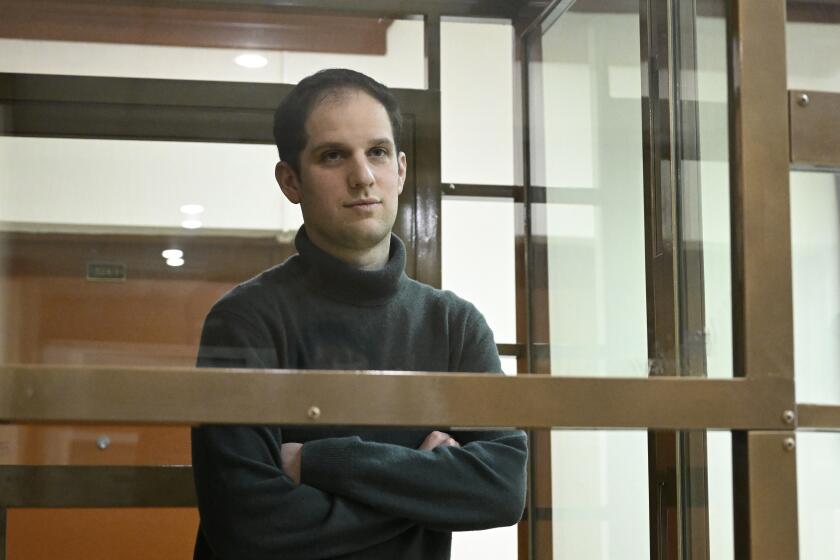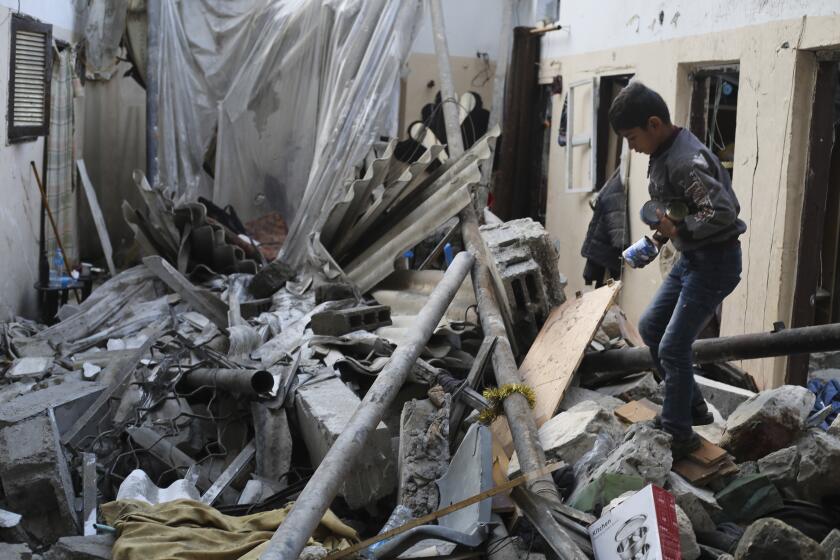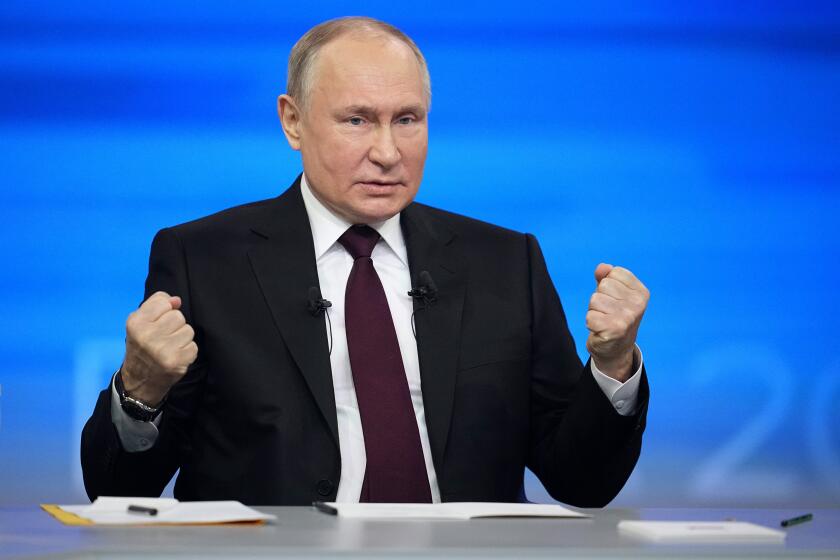Romanian Ally of Gorbachev to Head New Regime : East Bloc: Ion Iliescu will be ‘provisional president.’ State TV shows the executed bodies of Ceausescu and his wife.
In a shift from 20 years of political detachment from the Soviet Union, a longtime ally of Soviet President Mikhail S. Gorbachev was named Tuesday as provisional president of Romania.
Romanian national television reported that Ion Iliescu, 59, a veteran Communist Party official considered by many to be “Gorbachev’s man in Romania,” will serve as “provisional president of the Provisional Council” of the country.
Named as vice president of the ruling council was human rights activist Dimitru Mazilu, author of a scathing United Nations report on human rights abuses under the regime of dictator Nicolae Ceausescu.
Also Tuesday, state television showed the first film of the executed bodies of Ceausescu and his wife, Elena, who for 24 years wielded absolute power over the totalitarian police state sometimes described as a mixture of Stalinism and Byzantium.
They were shot by a three-man firing squad in a dank, rain-soaked courtyard at 4 p.m. on Christmas Day. Their bodies, still wrapped in overcoats and scarfs, were shown slumped at the base of a crumbling plaster wall.
Elena Ceausescu reportedly told the firing squad assembled to execute them: “We want to die together, we do not want mercy.”
Capt. Mihai Lupoi, who briefed reporters on the Ceausescus’ last hours, said soldiers had been asked to volunteer for the squad.
“Everybody volunteered,” he said, adding that it had to be chosen by lot from about 300 men.
As the two were led out for execution, Elena said to the soldiers: “I was like a mother to you,” Lupoi said.
“What sort of a mother were you, who killed our mothers?” one soldier replied.
Television also showed film of an unrepentant Ceausescu arguing angrily at the army tribunal Monday. “I will answer nothing. I will sign nothing. I will not recognize this court,” he said.
Dressed in a dark suit and a black overcoat, Ceausescu looked gaunt and tired but smiled as a man in a white coat checked his blood pressure. No explanation was given for the test.
The new government’s prime minister, Petre Roman, said the executions may have been a “mistake” but added that “there were pressures.” Interviewed on French television, Roman said the army feared Ceausescu loyalists would try to rescue the dictator if he were not killed.
Roman, a professor at Bucharest Polytechnic University, led the takeover of the state television and radio networks, which proved to be a critical factor in Ceausescu’s downfall last Friday.
Picked as minister of defense was Col. Gen. Nicolai Militaru, retired commander of the Bucharest garrison, one of the first military men to appear on the liberated television station in support of the uprising.
The announcement marked the first important shakedown of the new National Salvation Front government, which up to now had functioned as an unwieldy committee of 39 widely diverse people, ranging from religious charismatics to movie actors and Communist Party members.
Given the absence of organized political parties in the country, reaction to the new government was hard to gauge.
Several hours after the names were announced on state television, several hundred angry demonstrators gathered on the central Plaza of the Republic, outside the former headquarters of the Romanian Communist Party, shouting, “Lies! Lies!” and “We want democracy without communism!”
A group of dissidents, some of whom had been jailed under the Communists, denounced the new government for its heavy reliance on top Ceausescu-era officials.
Washington moved quickly to recognize the new Romanian leadership. U.S. Ambassador Alan Green presented the Romanian Foreign Ministry with an official statement welcoming the new government as the “manifestation of the political will of the Romanian people.”
Aid Pouring In
Sources said Iliescu has tentatively set a meeting with the American envoy today, in part to discuss distribution of massive amounts of medical and food aid that have poured into the country since the uprising began Dec. 16 in Timisoara, a western Romanian city of 300,000 people.
Although American officials appeared pleased with the new leadership, the main long-term beneficiary may be the Soviet Union.
Since the Soviet-led invasion of Czechoslovakia in 1968, Romania has been a thorn in the side of Soviet foreign policy. In 1968, Ceausescu was the only Warsaw Pact leader who refused to participate in the military operation in Czechoslovakia.
Under Ceausescu, Romania opposed the Soviet invasion of Afghanistan in 1979 and refused to support the Soviet-backed regime in Cambodia. It was the only Soviet Bloc country to participate in the 1984 Olympic Games in Los Angeles.
Because of Ceausescu’s maverick anti-Soviet stance on foreign affairs, the United States for years ignored widespread internal human rights abuses under the totalitarian police state.
Until 1987, the United States granted Romania “most favored nation” trading status that gave the Ceausescu regime a range of tariffs and interest-payment concessions. As the Cold War melted under Gorbachev, however, Romania lost its usefulness as a thorn in the Soviet side. Citing gross human rights violations, the United States withdrew the special trade status in 1987.
Conversely, the Soviet Union was willing to ignore Romania’s rebellion on foreign policy. As long as the Ceausescu regime remained harsh and cruel, the Soviets did not have to face the scary prospect of Romanian nationalism jumping across their borders into Soviet Moldavia, where the majority of the population speaks Romanian and shares ethnic traditions with their neighbors.
Although Ceausescu occasionally attempted to appeal to Romanian nationalism across the Pru River in Soviet Moldavia, it never was attractive to Moldavians, who viewed the Bucharest regime as more onerous than their own.
With Romania finally on the road to reform, Moscow needs a friend in Bucharest, and many here believe they have found one in Iliescu, the interim Romanian president. Intelligent, fluent in Russian and English, Iliescu’s major flaw appears to be his longtime affiliation with the Communist Party here, although he is generally considered a dissident within the party.
According to diplomats here, Iliescu befriended Gorbachev when they were university students in Moscow and attended international Communist youth meetings together.
Rose in Ranks
After graduating from the Polytechnical Institute in Moscow, Iliescu was a powerful leader in the Romanian Communist Party until he criticized Ceausescu at a party conference in 1972. After that, he was removed from the party’s Central Committee and given a series of minor jobs in the government, most recently as director of the central publication house.
In 1987, he again demonstrated a break with Ceausescu when he published a full-page article in a literary weekly, Romania Literara, calling for greater freedom of information and the liberalization of social and political relations.
“Iliescu has always been waiting in the wings,” one Western diplomat here said. “He is widely known as Gorbachev’s man in Romania. They attended meetings together in Moscow in the 1950s.”
Rebuilding leadership in a political void after the 14-year dictatorship of Ceausescu is proving to be very difficult here.
“In Romania, you start from scratch,” one diplomat said. “In East Germany and Czechoslovakia, you at least had some kind of government that was able to serve during the transition. Ceausescu was alone. Once he was gone, there was nothing left.”
By Tuesday, it was clear that the committee of 39 people that had been hastily patched together to form the National Salvation Front was no longer functioning as a unit. Several members had quit and were planning new political parties. At least four new parties have emerged in the four days after Ceausescu’s fall.
The streets were much calmer Tuesday in Bucharest and, according to reports, in other Romanian cities, than on any day in the previous week.
Meanwhile, estimates of people killed in the days of fighting here were greatly diminished Tuesday. Officials at the Ministry of Health estimated that 500 people died on the streets of Bucharest, not the thousands mentioned in some news accounts.
In Timisoara, where leaders of the uprising had once estimated 4,666 deaths, only 20 bodies have so far been shown to reporters, and several of those appeared to have been dead for many months, not a matter of days.
Western diplomats said Tuesday that they believe the overall death toll from fighting across the nation is more than 1,000, but they conceded that no one has been able to provide a documented number.
A BOAST BACKFIRES:Students used pears to defy Ceausescu. A12
CAUGHT IN COMBAT:Romania violence catches journalists off guard. A15
Start your day right
Sign up for Essential California for news, features and recommendations from the L.A. Times and beyond in your inbox six days a week.
You may occasionally receive promotional content from the Los Angeles Times.




